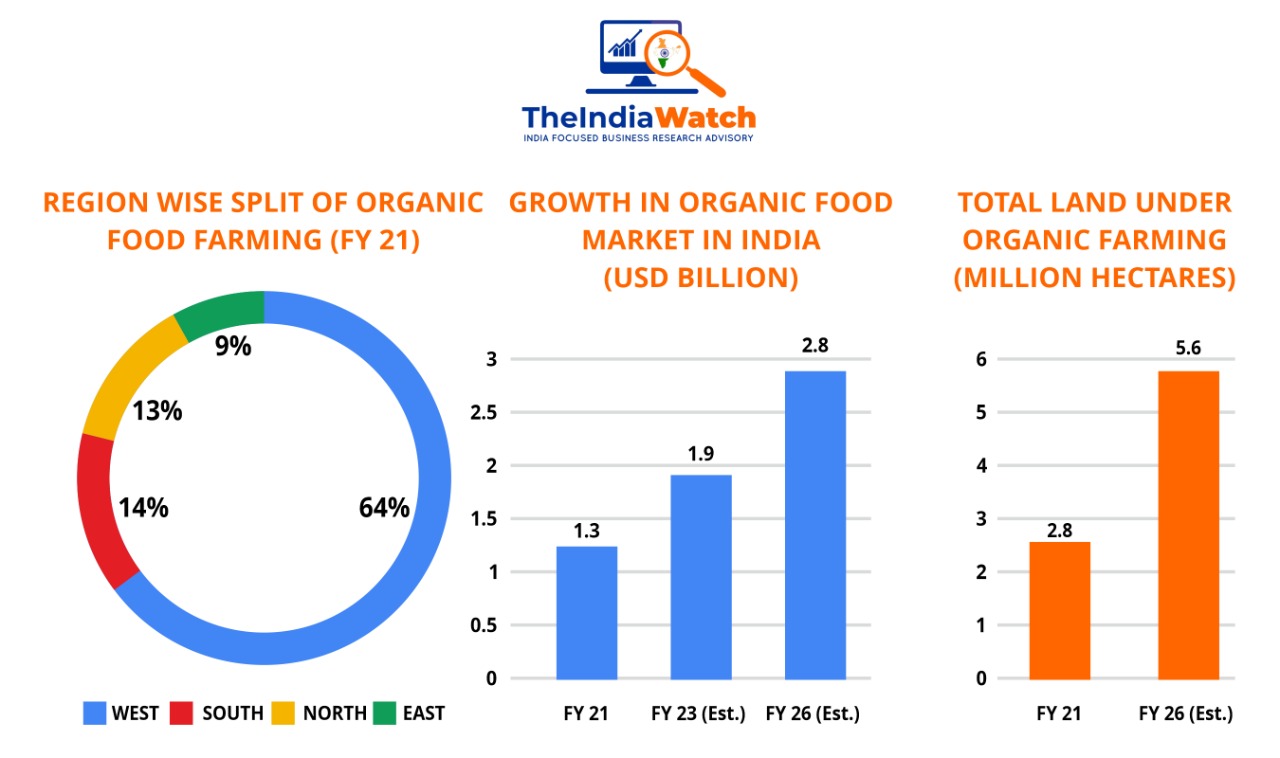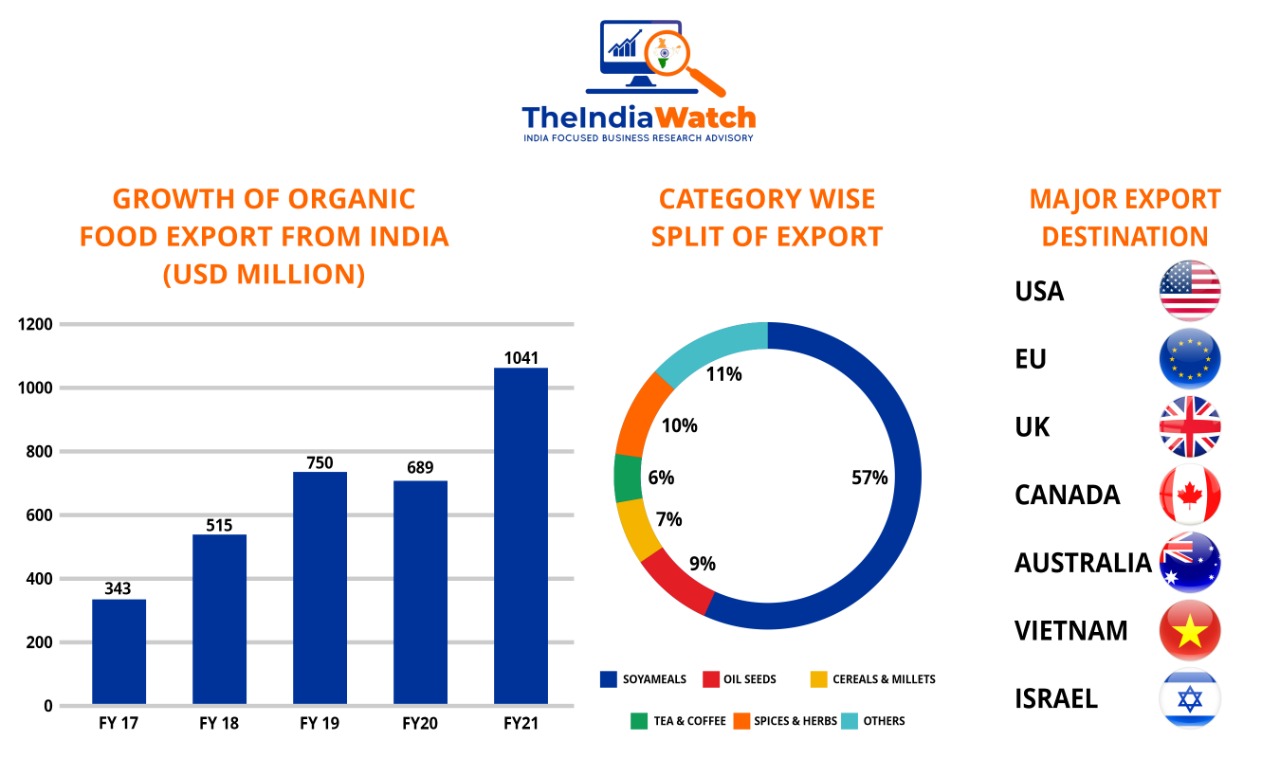-
Your trusted market research partner
- info@theindiawatch.com
- 8076704267

Indian Organic Food Market is Set to Grow at a CAGR of 16.6% (2021-2026)
The Indian organic food market, which is valued at USD 1.3 billion is on an evolutionary trajectory. India still holds a small share (0.6%) in the global organic food market, which is valued at USD 227 billion. However, the demand is on an upswing, as increasingly Indian households are realizing the significance of a chemical-free, healthy and holistic lifestyle. In another 5 years, the total value of the organic food market in India is expected to reach USD 2.8 billion, growing at a CAGR of 16.6%.Traditional farming practices that rely on synthetic fertilizers and pesticides have resulted in higher nitrate components and low antioxidants amongst food items. This not only affects the shelf life of food but also creates health hazards. A healthier alternative is adopting organic farming practices that mostly leverage biofertilizers, organic manures, healthy crop rotation, and natural pest control. Such food products do not contain synthetic chemicals, have better nutritional values as well larger shelf life.
The recent pandemic has also influenced wider changes in food consumption habits amongst Indians with an increased focus on immunity-building foods. This is resulting in many households now shifting to organic foods.Besides, domestic consumption, India is also gradually extending its footprint in the global export market. Currently, the annual exports of organic foods from India are valued at USD 1041 million.

Growth Drivers of Organic Food & Farming in India
- India has traditionally relied on organic farming as good monsoons and high-quality soil ensured limited use of pesticides and fertilizers in the past. However, in the 1960s & 70s, the use of synthetic fertilizers and pesticides spiked, altering the traditional ways of farming. The use of chemicals resulted in higher productivity but also affected health. Amidst rising health awareness, once again organic farming in India is becoming popular.
- Earlier cost of organic food was high, which undermined its demand. However, as the scale of demand is rising, the cost of production is reducing. Currently, at a modest incremental cost of ~ USD 20, a household can switch to organic food consumption.
- At present, there are 1.1 million farmers, who have been awarded certificates for organic farming. Presently, there are around 2.8 million hectares of cultivatable land under organic farming. GOI plans to double it in the next 5 years.
- As global demand is rising, India is also ramping its export of organic foods. The country is already a leader in the organic tea category. In other key categories such as Fruits & Vegetables (F&V), cereals, spices & herbs, etc, its share of global trade is growing upwards.
- Lower consumer awareness about organic food has been one of the major factors behind India's low share (0.6%) in the global market. However, the impact of lowered consumer awareness is now mitigated with the help of networks of food influencers and bloggers active across emerging social media platforms such as Facebook, Youtube, and Instagram.
- In the foreseeable future, the organic food market is also poised to grow faster in India on the back of the rise in modern retail coupled with growth in e-commerce. Modern retail chains such as Godrej Nature Fresh, More, Spencer, Kisan Mart, 24 Seven, Fab India, etc. are giving increased shelf space to organic food items. Likewise, large e-commerce players such as Amazon, Flipkart, etc alongside vertical grocery players such as Big Basket, Groffers, etc. are also foraying into the organic categories.

Policy Support for Organic Farming
Various government and agricultural agencies, both at the center and state levels are offering policy support for organic farming. This includes capacity building, awareness & training, infrastructure development alongside post-harvest marketing support. Through collective effort, presently there are 2.8 million hectares of land under organic farming, climbing by a CAGR of 15.5% from 2014. In the next 5 years, India plans to double down on the total land under organic farming
Under the Prampragat Krishi Vikash Yojna (PKVY), financial assistance of INR 50,000 (USD 675) is provided for each hectare of land for 3 years. The assistance involves training, input cost support, and marketing. The North-Eastern region in India has the potential to become a hub for organic food production. It produces plenty of F&V, cereals, and herbs that have high international demand. Under the mission, Organic Value Chain Development, financial assistance of INR 25,000 (USD 337) is provided for each hectare of land to support farmers to grow organic foods. The government is also offering lucrative financial incentives in the region to improvise overall infrastructure for organic farming.
Under the Capital Investment Subsidy Scheme (CISS), 100% assistance (up to USD 260,000) is provided to center and state government agencies to develop Agri waste and bio-waste manure facilities. For private parties, the incentive has been capped at 33%.
How India Watch Can Help
Poise to grow at a CAGR of 16.6%, India's organic food industry is a lucrative market to enter. The government is also committed to boost export and enhance supply in the local market through Policy Impetus, which will further act as a growth enabler. Currently, there are limited players in the market. However, as the category is set to grow vigorously, more domestic and international entities will enter the space. 100?I is also allowed under the automatic route in agricultural activities, which is also luring international companies to set up in India.
However, winning in Indian markets will also require access to a lot of actionable data, research, and insights. India Watch as an India-focused research & data advisory can offer the required market research services, conduct business feasibility studies, and render data-centric insights.
As a Research Advisory, we can offer a range of services
- Market surveys & research to evaluate consumer behavior
- In-depth interviews, qualitative studies, focus group interviews, etc to learn about consumption pattern
- Devise end-to-end Market Entry & Growth strategy for international companies looking to explore the Indian market
- Customized research & data advisory on the Organic food industry & market including competitive landscape, customer segments, consumer behavior, pricing, distribution structure, etc.
- Test the feasibility of the new product in the Indian market
